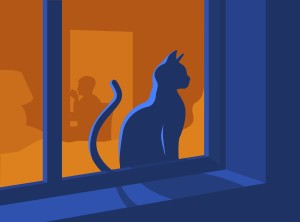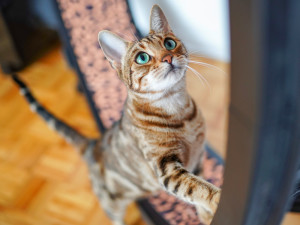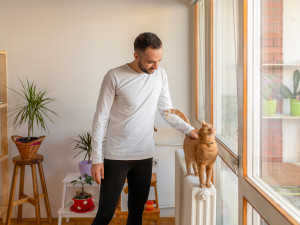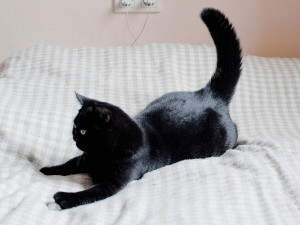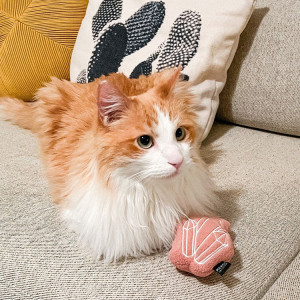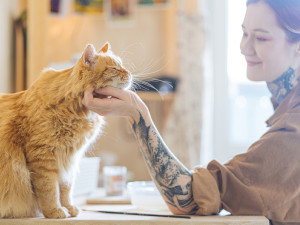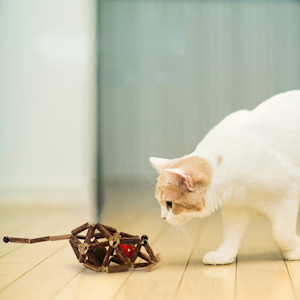Why Is My Cat Suddenly Clingy?
They’re never far away, but you’d like a little distance.
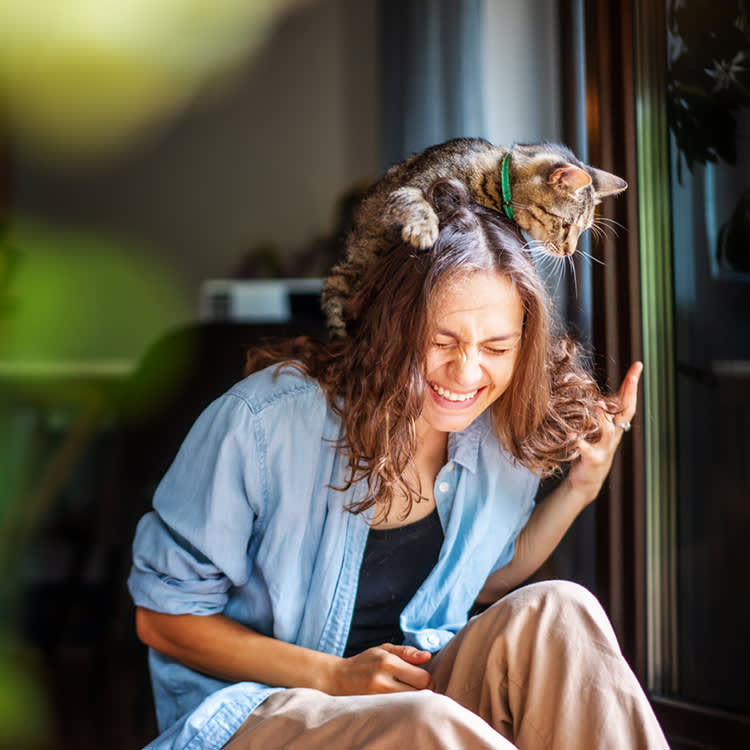
Share Article
In This Article:
Understanding Clinginess in Cats Signs Your Cat Is Clingy Should I Be Worried If My Cat Is Suddenly Clingy? Reasons for Sudden Clinginess in Cats How to Respond to Sudden Clinginess in Clingy Cats How to Encourage Independence in Clingy Cats How to Handle Your Clingy Cat Frequently Asked Questions
Cat parents understand that these enigmatic kitties are usually the masters of their own solitude. So, when they grace us with their affection, whether it’s a gentle leg rub or a soothing purr on our laps, we embrace it with open arms and never take these moments for granted. But if your feline friend suddenly transforms into a stage-five clinger who showers you with all the attention, it’s only natural to wonder if something’s amiss.
Figuring out why your cat is suddenly clingy can feel like solving a cryptic puzzle with multiple pieces. While there are a handful of potential reasons, one common trigger is a change in their environment or routine, which can send their world into a tailspin. Cats can also become clingier when they’re experiencing pain, discomfort, illness, stress, or anxiety. It’s important to keep a vigilant eye out for any behavioral shifts or signs of physical distress so you can address the issue ASAP.
Sometimes the solution can be as easy as giving them a little extra attention, but any persistent or concerning changes in your cat’s behavior should be brought up to your veterinarian or an animal behaviorist. If your furry companion has suddenly thrown you a behavior curveball, read on to learn more about what causes clinginess in cats, how to respond to it, and how to get your feline back to their independent self.
Main takeaways
If your cat follows you everywhere in the house and can’t stand to be apart from you, you probably have a clingy pet.
There are several potential reasons for cat clinginess, including changes in routine or environment, illness, or stress.
If your cat suddenly starts acting clingy, take note of their behavior and try to figure out what they want to communicate.
Spend regular time with your cat and establish a routine to help foster their independence.

Understanding clinginess in cats
Decoding a clingy cat’s behavior can be quite a feat — and understanding it requires some knowledge about cat body language. Your cat may be clingy if they meow persistently, follow you around the house like a furry shadow, or insistently demand your attention by pawing at your legs. These affectionate gestures are their way of saying, “Please pay attention to me right now!” When your cat starts acting like this, it’s time to address their newfound need for closeness with some easy at-home fixes or a visit to the vet — and this depends on what’s causing the clingy behavior.
Signs your cat is clingy
How do you know you’ve got a clingy cat on your hands? Look for these signs:
They follow you everywhere (bathroom included).
They’re constantly rubbing against you or kneading you.
They sit or sleep on you or near you at night.
They meow or vocalize loudly.
They engage in destructive behaviors when left alone.
Should I be worried if my cat is suddenly clingy?
Whether or not you should rush your cat to the vet when they act clingy depends on their normal behavior. If your cat is a bit of a snuggler, clinginess may just be part of their personality. But if your cat is more standoffish, a sudden increase in closeness could indicate that something is wrong.
“Any time your cat is suddenly exhibiting a new behavior that seems strange, it’s a good idea to go for a vet checkup,” cat behaviorist Kristiina Wilson says. “Cats are masters at hiding pain and illness, and often the only way to know they aren’t feeling well is by looking for behavioral changes (i.e., they are sleeping more or less, sleeping in different places, eating less, wanting more or less attention, etc.). To keep from worrying, get a checkup for your furry friend ASAP!”
Reasons for sudden clinginess in cats
When your once solitude-loving feline decides to be your attention-seeking bestie, you might be ridiculously confused. Wilson emphasizes that there are so many reasons for your cat acting clingy: “An addition or subtraction of a person or pet from the household, a change in the environment (i.e., a move or even rearranging of furniture), boredom (cats need lots of intellectual stimulation), a health issue, stress, fear, or some unknown, unmet need.”
Change in routine
Cats are pretty big on routines, and even the tiniest shake-up in their daily groove can leave them a tad bewildered. Whether it’s a new work-from-home arrangement or a change in their feeding time, these shifts can trigger clingy behavior as your cat seeks reassurance in familiar surroundings.
Separation anxiety
Cats might not bark about it like dogs do, but they can totally get hit with a case of the “I-miss-my-human” bluesopens in new tab. If you’ve been clocking more hours away from home or your schedule’s a bit wonky, your cat might follow you everywhere to find some comfort while you’re out and about because of their separation anxiety.
Stress
Cats are like emotional sponges, and when stress or anxiety creeps in, it can manifest in different ways. If your feline is suddenly super clingy, it could be their way of coping with a stressful situation. Things like moving to a new home, the addition of a new pet, or even noisy renovations can trigger stress and lead to this peculiar behavior.
Sudden changes in their environment
If anything changes drastically in your cat’s environment, they could feel stressed and look to you for comfort. This can be something as minor as a new piece of furniture in the home or as big as a new pet in the house.
Boredom
A lack of mental or physical stimulation can cause boredom, which may lead to your cat begging you for entertainment. If your cat doesn’t have anything to do other than seek attention, they could simply need more interactive toys to keep them engaged.
Hunger
A clingy cat may simply be craving a snack. Make sure to feed your cat at the same times each day so they know when to expect food and don’t panic if their bowl isn’t immediately full.
Medical condition or illness
When our cats aren’t feeling top-notch, they often turn to us for support. Sudden clinginess can be a sign that your cat isn’t feeling well. Keep your radar on for other signs like changes in appetite, excessive sleepiness, or grooming habits — these can all point to an underlying medical issue.
Pain
Cats experience aches and pains just like we do. If your cat is getting all cuddly but winces when you touch a specific spot, that’s a red flag that they’re hurting. Pay close attention to their body language to figure out if pain is the culprit behind their clinginess.
Your female cat is in heat
Ladies, this one’s for you — our female kitty pals sometimes get hit with the love bug when they’re in heatopens in new tab. If your cat’s clinginess coincides with her heat cycle, it’s a biological response to attract potential mates. Don’t worry, this phase will eventually run its course.
Old age
As our cats get older, their needs and behaviors can change. Senior cats might start leaning into clingy mode as they search for extra comfort and company in their golden years. Think of it as their way of enjoying retirement — it’s all part of the aging package.
You’re pregnant or ill
Not to freak you out, but believe it or not, cats have a knack for sensing changes in their humans’ health. If you’re expecting a baby or dealing with an illness, your cat’s extra clingy behavior might be their way of giving you some TLC or just checking in on you. If your cat’s in good shape, but you’ve been feeling a bit funky, it could be worth booking a doc appointment to double check that your cat isn’t trying to drop you a subtle hint.
How to respond to sudden clinginess in clingy cats
When your furry friend goes all clingy on you out of the blue, don’t worry — there are just two simple steps to take.
Observe and assess
First off, kickstart your detective mode. Keep a close eye on your clingy cat’s behavior. Are they showing any signs of distress, like unusual meows, changes in appetite, or weird grooming habits? Try to suss out if there’s something specific triggering their clinginess, like a new neighbor’s noise construction project or a recent move. This observation phase can help you understand what might be driving your cat’s need for extra cuddles.
Consult a veterinarian
If you’ve done your Sherlock Holmes act and still can’t pinpoint the cause, or if your cat’s clinginess continues for more than a couple of weeks, it’s time to call in the experts. Schedule a visit to your cat’s vet to rule out any underlying medical issues. A vet can help decode your cat’s behavior and ensure they’re in the best health possible. When in doubt, let the pros take a look, and you and your kitty can go back to enjoying those cuddle sessions worry-free.
“If you’re not sure what’s going on and you’ve gotten an all clear on health from your vet, collect data!” Wilson says. “Start a log and note the date, time, and location that your pet is being ‘clingy.’ Perhaps you’ll see a trend and notice that they’re exhibiting this behavior around mealtime or bedtime or if a certain friend comes over. Either way, paying more attention to events surrounding your pet will only help you understand them more and get closer to them. But first, that very important vet visit!”
How to encourage independence in clingy cats
Having a cat who’s stuck to you like glue may seem cute, but sometimes we just need our space. Here are some easy steps to help your clingy cat spread their wings and become a bit more independent:
Stick to a routine: Cats love routine. Try to feed them and play with them at around the same time each day. Predictability can help them feel secure and less reliant on your constant attention.
Make your space cat-friendly: Create a space where your cat can explore and hang out on their own terms. Add cozy spots, toys, scratching posts, and maybe even a room with a view. This way, they’ll have plenty of options for entertainment.
Provide interactive toys: Invest in toys that you cat can play with independently, like puzzle feeders or automated laser toys. These gadgets can keep them engaged and entertained even when you’re not around.
Encourage solo play: Gently nudge your cat toward solo playtime. Start by showing them how to use toys and gradually step back. Soon enough, they’ll be chasing that feather toy like a pro.
Use positive reinforcement: Reward your cat when they display independent behavior. Treats, praise, and affection can reinforce their self-reliance.
Respect their space: If your cat chooses to be alone, respect their privacy. Don’t force interactions when they’re in their “me-time” zone.
At the end of the day, it’s about helping your clingy cat discover their inner independent spirit while still enjoying those precious moments of snuggles when they’re in the mood. And while a clingy cat isn’t always an alarm for something serious going on, it could be. So the best thing you can do as a cat parent is keep your eyes peeled for any unusual, persistent behavior and reach out to the pros for guidance.
Final thoughts: How to handle your clingy cat
The best way to deal with a clingy cat is to start by making sure you’re meeting their needs for affection. Make sure to spend time with your cat each day, petting them, playing with them, and just being together. Doing so can strengthen your bondopens in new tab with your cat and help them feel loved and secure.
If you’re not meeting your cat’s emotional needs, the result may be an overly clingy feline companion, desperately looking for attention. While not necessarily a bad thing, a cat who doesn’t get the attention they need could resort to destructive behaviors.
FAQs
Is my cat clingy because they are trying to tell me something?
One cause of clinginess in cats is that they’re trying to tell you something, either about themselves or you. They might be trying to communicate that they’re feeling a bit under the weather, they’re stressed out, or maybe they’ve picked up on changes in your life, like a new job or a new addition to the family. Take a moment to understand their signals and you might uncover the message they’re trying to deliver.
Will my cat stop being clingy?
Whether your cat stops being clingy will depend on what’s causing the clinginess in the first place. If it’s circumstantial, like you just moved to a new house and that’s when you started to notice the clinginess, the behavior will likely subside once they’re feeling safe and settled in their new digs. But if the clinginess is due to an underlying medical condition, they’ll likely continue the behavior until you address it with your vet and get them the help they need.
What should I do if my kitten becomes clingy?
If your kitten suddenly starts to stick to you like glue, make a point to observe and record their behavior. Include details about when the clinginess started, how long it’s been going on, and what changes you’ve seen in their body language and behavior. If their newfound love for constant attention persists, bring it up with their vet so they can make sure there’s not anything else going on.
Are certain cats more likely to be clingy than others?
Some cat breeds may be clingier than others, such as highly social breeds like Ragdoll, Maine Coon, Siamese, Burmese, and Devon Rex. However, each cat is an individual, and any clinginess may be a result of other factors, such as their environment.
References
Bundy, Brooke. “Cat Suddenly Clingy? 7 Vet Reviewed Reasons & What to Do | PangoVet.” PangoVet, 6 Sept. 2024, pangovet.com/pet-behavior/cats/cat-suddenly-clingy-why/opens in new tab. Accessed 16 Dec. 2024.
ElleVet Sciences. “Clingy Felines: Why Does My Cat Follow My Everywhere?” ElleVet Sciences, 31 Oct. 2022, www.ellevetsciences.com/cbd-for-cats/why-does-my-cat-follow-me-everywhere/?srsltid=AfmBOoomPg_FF_jKKyQ7joqwFqjYfRxzYxJVE6Fgrel62NvV1mkUAsSjopens in new tab. Accessed 16 Dec. 2024.
Estaff. “The Cat-Human Bond.” Catwatch Newsletter, 21 Sept. 2021, www.catwatchnewsletter.com/behavior/the-cat-human-bond/opens in new tab.
Xuan, Jia. “Study on One of Human’s Closest Friends, Cat, from the Perspective of Physiological Characteristics.” Animal Molecular Breeding, vol. 13, no. 0, 19 June 2023, animalscipublisher.com/index.php/amb/article/view/3752opens in new tab.

Courtney Elliott
Courtney Elliott, a proud Cleveland native living in Manhattan, blends her decade of writing and editing expertise with her unshakable devotion as a pet parent to her French Bulldog, Gus. When she’s not at her desk, you’ll find her frolicking in Central Park or engrossed in a good book at a local coffee shop.

Savannah Admire
Savannah Admire is a writer and pet mom to two dogs and a cat. Under the name Savannah Cooper, she has published poetry in 40 different publications, as well as a poetry book, Mother Viper (2025). When she’s not writing, you can find her reading, taking photos, or volunteering as a content creator for her local community theatre. As a pets writer, she focuses on cat and dog behavior and pet parenthood. She currently lives in Western Maryland.
Related articles
![orange cat being stroked by man]()
Why You Need a Cat Sitter in Your Inner Circle
Pssst… Your cat’s cool loner persona is all an act.
![black cat doing zoomies on a bed]()
Your Cat’s Erratic Zoomies — Explained
Fast, furious, and officially normal — according to a cat behaviorist.
![cat with the crystal toy in pink]()
You Can Transfer Your Woo-Woo Crystal Habit to Your Stressed-Out Cat
Merci Collective founder Chani Ronez on her new collection of crystal and catnip-infused toys for cats.
![Cat being affectionate towards woman with tattoos]()
The Feline Five Is a Personality Test That Could Actually Be Useful
You could solve the mystery that is your kitty.
![woman sits on a bed looking solemn, alongside her cat]()
You Might Be the Reason Your Cat Is So Moody, Study Finds
Good thing they can’t talk about you in therapy.
![a cat sniffs a silver vine toy]()
This Catnip Alternative Will Blow Your Cat’s Mind
If cats had their own TikTok trends, this would be one.

